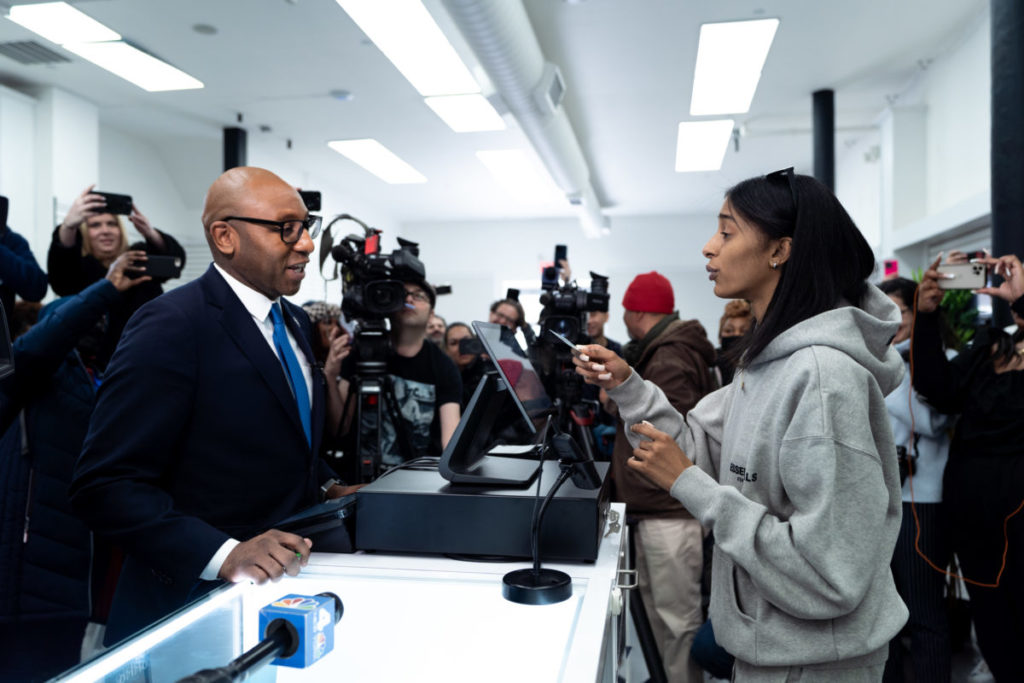
At Good Grades, Extasy James’ New York City dispensary, you can buy something you can’t pick up at most other legal cannabis shops: a dime bag.
For those unfamiliar, it’s a small amount of marijuana – roughly a gram – packaged in a small plastic bag and sold for $10. Most dispensaries sell cannabis in larger portions contained in sleek glass jars, and at much higher price points. Good Grades offers all of that – but “you need to think about low-income people” as well when running a business like this, James asserts.
She recently made history by launching the first woman-owned recreational cannabis dispensary in New York state. Good Grades’ March 2023 debut came with much fanfare – members of the press packed in, and Queens Borough President Donovan Richards showed up to make the very first purchase.
But it’s James’ recognition of her neighbors’ needs and histories – the pricing and products that harken back to a legacy cannabis market of longtime sellers working from homes and street corners, instead of state-funded storefronts – that truly makes her operation stand out. “It’s a great feeling, giving back to the community and letting them know it’s a safe space,” she says. “I want to make sure [customers] know that nobody is going to bother you.”
In the Jamaica, Queens neighborhood where she both lives and works – an area whose residents are largely Black and Latino, and that exists at the center of three New York Police Department precincts – cannabis arrest rates were consistently high prior to statewide legalization in 2021, and disproportionately so in comparison to other, whiter parts of the city.
You needn’t tell James this. When she was just 3 years old, her father was deported back to his home country of Jamaica, in light of several cannabis-related charges. He remains there to this day. “It impacted me greatly – my mother has four children, and I’m the oldest, so I stepped up.” James has seen other families go through the same ordeal, she adds.
It’s a lasting impact of the so-called war on drugs, a multibillion-dollar, decades-long, American campaign toward drug prohibition that has, in practice, brought devastating repercussions for those arrested and tried for drug-related charges – as well as their families, neighbors and communities.
“I’m somebody who’s witnessed [the impact of the war on drugs] myself” – which, James says, makes her auspicious dispensary opening “bittersweet.”
For a Limited Few, a Second Chance
Though cannabis is still listed as a Schedule I substance by the U.S. government, it’s now legal for medicinal use in 38 states, and for recreational use in 21.
There have been signs of progress toward national legality in recent months. President Joe Biden announced a mass pardon last fall for all individuals convicted of federal marijuana possession charges – an act of clemency that expunged the records of about 6,500 individuals.
That act, however, only chipped away at a much bigger problem, as tens of thousands of people continue to languish in prison for non-federal cannabis offenses. Black Americans remain far more likely to be arrested on, and convicted of, marijuana-related charges. Black, Latina and Indigenous women in particular significantly outclip their white, female peers when it comes to drug arrest rates, despite drug use happening at similar rates across demographic groups.
Releasing those incarcerated on cannabis charges is only one part of the equation. Those no longer in prison still struggle with housing and job loss, falling credit scores and other hurdles put in place after serving their sentences. They, too, are mostly people of color.
In states that have enacted legalization, programs are cropping up to more tangibly assist people like James, whose families were harmed by cannabis over-policing. She and her cousin Michael, who is also her co-founder and a cannabis attorney, were able to open Good Grades thanks to one such program: the New York State Social Equity Cannabis Investment Fund. “They were giving people a chance that had been convicted or wrongly accused of cannabis possession – giving families a second chance,” James says.
The $200 million fund, launched in June 2022, is a collaboration between private investors like NBA Hall of Famer Chris Webber and New York government entities. When she announced it, Governor Kathy Hochul called it “an important step forward in creating jobs and opportunity for those who, historically, have been disproportionately targeted for cannabis infractions.”
Licensing for Good Grades, meanwhile, came from New York’s Conditional Adult-Use Retail Dispensary program, which similarly seeks to lift up would-be business owners most impacted by the war on drugs.
Despite the existence of such opportunities in New York and other parts of the U.S., James and her cousin are still very much the minority among cannabis entrepreneurs – even more so now than in past years.
A 2022 MjBizDaily report reveals declines among both women and minority cannabis business ownership. Last year, women accounted for 23% of all owners, while 12% of owners overall were people of color. Compare that to 2019, when women were nearly 37% of owners, and people of color were 28%. Experts largely attribute the decline to the pandemic, with white, male cannabis entrepreneurs faring better due to their historically easier access to capital.
James, for her part, has dreams of turning Good Grades into a franchise down the line. It’s about creating opportunities for as many people like her as possible, she says – opportunities to work, as well as to heal from past and present harms inflicted by racist cannabis policing.
And, she wants people – those reading about her from afar, to those living and working beside her in Queens – to see her store as representative of “a second chance.” She adds, “It’s a big step – not just for the community, but our family.” ◼️



